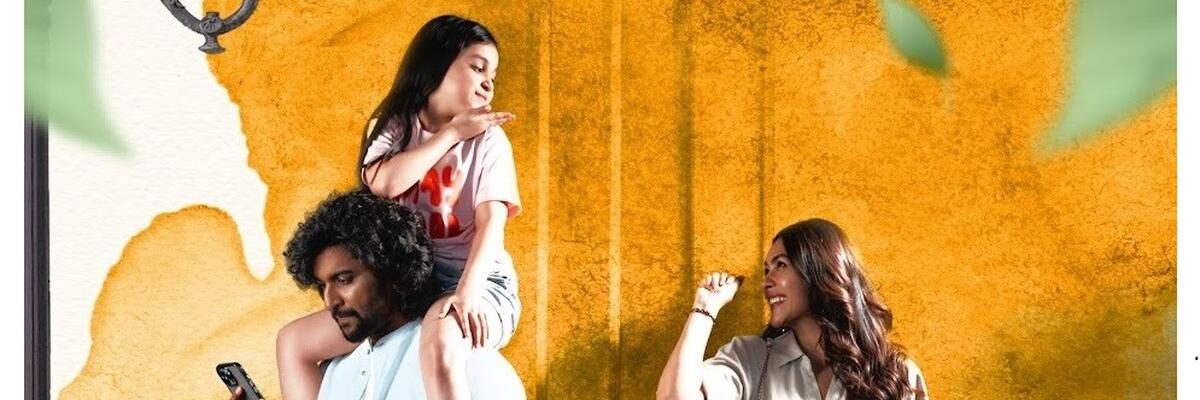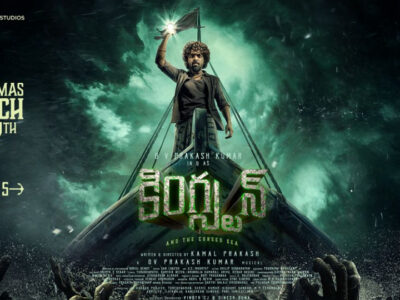Why Hi Nanna falls short of a fairy tale?
Hi Nanna appears to suggest that attitudes and perspectives in India haven’t progressed significantly from 1980s to now in 2023 says Kausalya Suharika R
Hi Nanna, a sentimental and romantic drama directed by Shouryuv, features a powerful cast including Nani, Mrunal Thakur, Baby Kiara Khanna, and Hesham Abdul Wahab in the music. Despite its strengths of strong cast, the facility to explore a beautiful screenplay, and a heartfelt music, their are some problematic misogynistic undertones that cannot be ignored.
Story: The movie starts with an awesome dedicated dad looking after his daughter, and everything seems pretty good. But here’s the twist – he never talks about the mom. Even though the daughter gets all the love and attention from her dedicated dad, she’s still curious about her mom. Then, out of the blue, their golden retriever named Pluto, like Tommy in ‘Hum Apke Hai Kaun’ brings an unexpected turn into their life. And that’s when things start to get interesting. The story unfolds around how this new addition shakes up their peaceful life and what it means for them.
While movies often serve as a mirror reflecting societal shifts, “Hi Nanna” appears to suggest that attitudes and perspectives in India haven’t progressed significantly between the 1980s and 2023. The film’s narrative and outcome offer little in the way of surprise of new age thinking, adhering to a familiar and predictable formula that fails to deliver on the promise of a modern or progressive story. Hi Nanna is the same old story in a new cup. It is the same old narration with a boring outcome at the end.
The film presents Viraaj (Nani) as the embodiment of perfection, an image constantly reinforced by other characters in the movie. However, his actions and attitudes paint a different picture, revealing a deep-seated misogyny typical of many Indian men. While he receives praise for being a single father, his true colors emerge when his daughter expresses her distress. Rather than seeking the reason for her unhappiness, he immediately reacts with visible worry upon hearing a boy’s name. This fixation on a single detail, neglecting to understand the root cause of his daughter’s emotional state, exemplifies a flawed paternal approach that falls short of the progressive ideal for fathers in 2023. His thinking is flawed and he cannot be the greatest character that the whole movie praises about.
Every Telugu movie bargains with the audience with these kinds of misogyny, that they should accept this as natural. Let me tell you, the same hero, who thinks this way about his daughter, also had photographed the heroine WITHOUT her consent, he doesn’t meet her, just start taking her photos and when she grabs his camera after taking a hundreds of pictures with the song in the backdrop, her reaction to the incident was easily made fun by the hero’s friend when they were thinking to go to police as if what they have done is not wrong. What’s so funny about a stranger taking photos of an unknown person and when confronted by her and supported by another man, and later taking the issue to the police office?
First, the so-called “ideal” hero harasses a woman, second, he threatens the guy that came to support that woman, how is that man a hero and not a negative character? The antagonists do the same harassment, so, how are we to differentiate who is the hero and who is the villain? Just because Nani plays this character, he is a hero and some regular actor who does antagonists roles, is a villain? Is that how the characters are written?
Viraaj is a dedicated father to his daughter throughout her medical condition, he is so dedicated to her that he wants to prove some point to the world that he can change anything! The problem with this notion is how many decades of this same kind of stories will Tollywood be telling to us? First, this is boring, add some reality to it, do some research as to how the real life survivors with this condition are doing, both the patients and their caretakers and family, please stop writing stories from air. Bring some respect to the script.
Mrunal Thakur, portraying the heroine, left me disappointed as I expected her seasoned experience would lead to a more thought-out character choice. She could easily be a 20-year-old woman, and starts crying like a baby as if she first heard her parents fighting. Crying over a childhood trauma is not wrong but a 20-year-old, who could have easily experienced it many times before and could have gained the knowledge to do what step has to be taken next, as an adult in this day and age should have shown a modern evolved character. I’m not saying this out of nowhere, women like this do exist in the current society, instead of complaining about their parents’ divorce, they understand what’s happened and try to be the adult and accept it and help others move on. When you see Miss Shetty Mr Polishetty, Anushka’s character went through the same, but you wouldn’t see her falling in love with a stalker and an eve teaser. The writing of Hi Nanna should have been evolved by this modern times, that although Yashna is in that mental space, her character arc should have shown a development of personal development rather than blindly believing her partner ALL THE TIME. This blind belief is again a source of dependency and the character arc is diminished instead of growing.
The total story played around the divorce has completely shown the divorce in a negative light, which Telugu cinema has been doing since ages!
All I’m saying is when a middle aged couple were constantly fighting, among all those 20 years, that would not be the first time that child experienced that. In her words- “It doesn’t add up”. Seeing them fighting for so long and finally doing what they should have done long ago, should be portrayed as a relief for the family. But NO. The entire family, the people around, everyone shifts the blame on the mother of the heroine, like she is the only person to blame for all of their sadness! Again “This doesn’t add up”. This shifting the entire blame to one person in relationship is the result of lazy writing, instead the director should have used the space to show the complexities of incompatibility. Infact, Yashna’s mother character reminded me of senior actress Vara Lakshmi’s characters in all those 1970s & 1980s movies where she acted as a villainous mother-in-law. Don’t we have enough of those, isn’t this the time to change already?
People are always striving hard to find out what is making them happy. Not everyone gets what they deserve or not everyone is happy about life, every single person has their own version of story. You can’t shift the blame to a single person and sit idle. Blaming a single individual and remaining passive doesn’t align with reality. This crucial aspect is entirely overlooked in the film, where the narration tends to categorize situations as either North or South i.e., either they are extremely good or extremely bad.
Stories that do not taboo divorce is the need of the hour!
Hi Nanna falls significantly short of being embraced as a coherent narrative; instead, it resembles a fairy tale with misogynistic undertones.
Overall, the movie is a remake of the old 1980s movies where the heroine conveniently forgets for the sake of the movie. Instead of this, they could’ve shown the realistic struggles of the characters with a child who needs more support.
The movie has wasted the talents such as Nani and Mrunal Thakur as the story doesn’t seem to impact much on the audience, nothing positive anyway, except dreams in the air.
Movies should steer clear of excessive close-ups and cinematography resembling YouTube or short videos. Some elements are better untouched, preserving the cinematic experience.
The only positives of the movie: The poetic dialogues, which are absent and are truly missed in present-day movies. Music stands out and is nice. And baby Kiara Khanna played the role like it’s not her first rodeo. Mastered every expression and every scene.
Note: I tried my best not to include more scenes for explaining the issues, only to avoid revealing any spoilers.
















